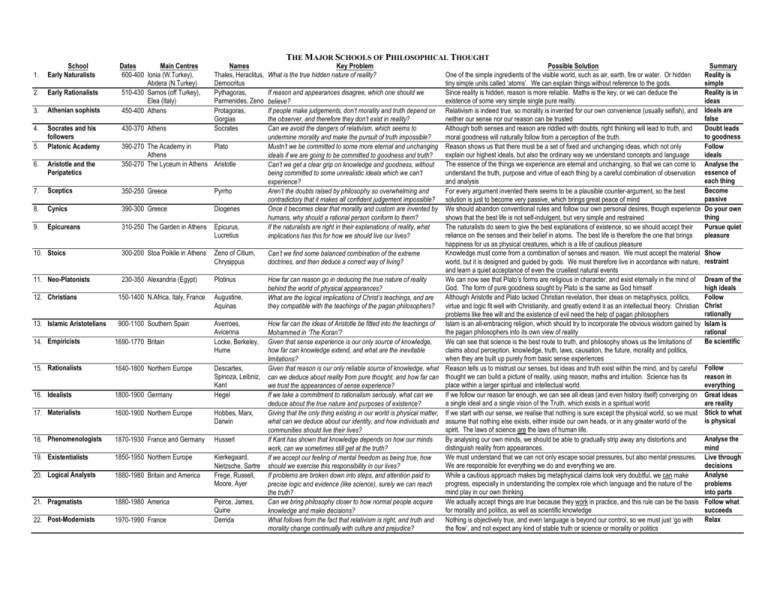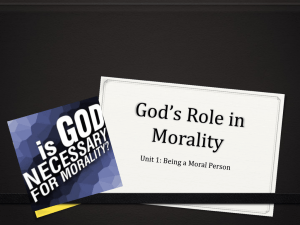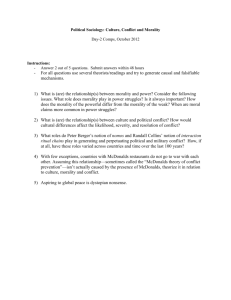THE MAJOR SCHOOLS OF PHILOSOPHICAL THOUGHT School
advertisement

THE MAJOR SCHOOLS OF PHILOSOPHICAL THOUGHT 1. School Early Naturalists 2. Early Rationalists 3. Athenian sophists 4. Socrates and his followers Platonic Academy Dates Main Centres 600-400 Ionia (W.Turkey), Abdera (N.Turkey) 510-430 Samos (off Turkey), Elea (Italy) 450-400 Athens Names Thales, Heraclitus, Democritus Pythagoras, Parmenides, Zeno Protagoras, Gorgias Socrates Key Problem What is the true hidden nature of reality? 6. Aristotle and the Peripatetics 7. Sceptics 350-250 Greece Pyrrho 8. Cynics 390-300 Greece Diogenes 9. Epicureans 310-250 The Garden in Athens Epicurus, Lucretius If reason and appearances disagree, which one should we believe? If people make judgements, don’t morality and truth depend on the observer, and therefore they don’t exist in reality? Can we avoid the dangers of relativism, which seems to undermine morality and make the pursuit of truth impossible? Mustn’t we be committed to some more eternal and unchanging ideals if we are going to be committed to goodness and truth? Can’t we get a clear grip on knowledge and goodness, without being committed to some unrealistic ideals which we can’t experience? Aren’t the doubts raised by philosophy so overwhelming and contradictory that it makes all confident judgement impossible? Once it becomes clear that morality and custom are invented by humans, why should a rational person conform to them? If the naturalists are right in their explanations of reality, what implications has this for how we should live our lives? 10. Stoics 300-200 Stoa Poikile in Athens Zeno of Citium, Chrysippus Can’t we find some balanced combination of the extreme doctrines, and then deduce a correct way of living? 11. Neo-Platonists 230-350 Alexandria (Egypt) Plotinus How far can reason go in deducing the true nature of reality behind the world of physical appearances? What are the logical implications of Christ’s teachings, and are they compatible with the teachings of the pagan philosophers? 5. 430-370 Athens 390-270 The Academy in Plato Athens 350-270 The Lyceum in Athens Aristotle 12. Christians 150-1400 N.Africa, Italy, France Augustine, Aquinas 13. Islamic Aristotelians 900-1100 Southern Spain Averroes, Avicenna Locke, Berkeley, Hume 14. Empiricists 1690-1770 Britain 15. Rationalists 1640-1800 Northern Europe 16. Idealists 1800-1900 Germany 17. Materialists 1600-1900 Northern Europe Hobbes, Marx, Darwin 18. Phenomenologists 1870-1930 France and Germany Husserl 19. Existentialists 1850-1950 Northern Europe 20. Logical Analysts 1880-1980 Britain and America Kierkegaard, Nietzsche, Sartre Frege, Russell, Moore, Ayer 21. Pragmatists 1880-1980 America 22. Post-Modernists 1970-1990 France Descartes, Spinoza, Leibniz, Kant Hegel Peirce, James, Quine Derrida How far can the ideas of Aristotle be fitted into the teachings of Mohammed in ‘The Koran’? Given that sense experience is our only source of knowledge, how far can knowledge extend, and what are the inevitable limitations? Given that reason is our only reliable source of knowledge, what can we deduce about reality from pure thought, and how far can we trust the appearances of sense experience? If we take a commitment to rationalism seriously, what can we deduce about the true nature and purposes of existence? Giving that the only thing existing in our world is physical matter, what can we deduce about our identity, and how individuals and communities should live their lives? If Kant has shown that knowledge depends on how our minds work, can we sometimes still get at the truth? If we accept our feeling of mental freedom as being true, how should we exercise this responsibility in our lives? If problems are broken down into steps, and attention paid to precise logic and evidence (like science), surely we can reach the truth? Can we bring philosophy closer to how normal people acquire knowledge and make decisions? What follows from the fact that relativism is right, and truth and morality change continually with culture and prejudice? Possible Solution One of the simple ingredients of the visible world, such as air, earth, fire or water. Or hidden tiny simple units called ‘atoms’. We can explain things without reference to the gods. Since reality is hidden, reason is more reliable. Maths is the key, or we can deduce the existence of some very simple single pure reality. Relativism is indeed true, so morality is invented for our own convenience (usually selfish), and neither our sense nor our reason can be trusted Although both senses and reason are riddled with doubts, right thinking will lead to truth, and moral goodness will naturally follow from a perception of the truth. Reason shows us that there must be a set of fixed and unchanging ideas, which not only explain our highest ideals, but also the ordinary way we understand concepts and language The essence of the things we experience are eternal and unchanging, so that we can come to understand the truth, purpose and virtue of each thing by a careful combination of observation and analysis For every argument invented there seems to be a plausible counter-argument, so the best solution is just to become very passive, which brings great peace of mind We should abandon conventional rules and follow our own personal desires, though experience shows that the best life is not self-indulgent, but very simple and restrained The naturalists do seem to give the best explanations of existence, so we should accept their reliance on the senses and their belief in atoms. The best life is therefore the one that brings happiness for us as physical creatures, which is a life of cautious pleasure Knowledge must come from a combination of senses and reason. We must accept the material world, but it is designed and guided by gods. We must therefore live in accordance with nature, and learn a quiet acceptance of even the cruellest natural events We can now see that Plato’s forms are religious in character, and exist eternally in the mind of God. The form of pure goodness sought by Plato is the same as God himself Although Aristotle and Plato lacked Christian revelation, their ideas on metaphysics, politics, virtue and logic fit well with Christianity, and greatly extend it as an intellectual theory. Christian problems like free will and the existence of evil need the help of pagan philosophers Islam is an all-embracing religion, which should try to incorporate the obvious wisdom gained by the pagan philosophers into its own view of reality We can see that science is the best route to truth, and philosophy shows us the limitations of claims about perception, knowledge, truth, laws, causation, the future, morality and politics, when they are built up purely from basic sense experiences Reason tells us to mistrust our senses, but ideas and truth exist within the mind, and by careful thought we can build a picture of reality, using reason, maths and intuition. Science has its place within a larger spiritual and intellectual world. If we follow our reason far enough, we can see all ideas (and even history itself) converging on a single ideal and a single vision of the Truth, which exists in a spiritual world If we start with our sense, we realise that nothing is sure except the physical world, so we must assume that nothing else exists, either inside our own heads, or in any greater world of the spirit. The laws of science are the laws of human life. By analysing our own minds, we should be able to gradually strip away any distortions and distinguish reality from appearances. We must understand that we can not only escape social pressures, but also mental pressures. We are responsible for everything we do and everything we are. While a cautious approach makes big metaphysical claims look very doubtful, we can make progress, especially in understanding the complex role which language and the nature of the mind play in our own thinking We actually accept things are true because they work in practice, and this rule can be the basis for morality and politics, as well as scientific knowledge Nothing is objectively true, and even language is beyond our control, so we must just ‘go with the flow’, and not expect any kind of stable truth or science or morality or politics Summary Reality is simple Reality is in ideas Ideals are false Doubt leads to goodness Follow ideals Analyse the essence of each thing Become passive Do your own thing Pursue quiet pleasure Show restraint Dream of the high ideals Follow Christ rationally Islam is rational Be scientific Follow reason in everything Great ideas are reality Stick to what is physical Analyse the mind Live through decisions Analyse problems into parts Follow what succeeds Relax






